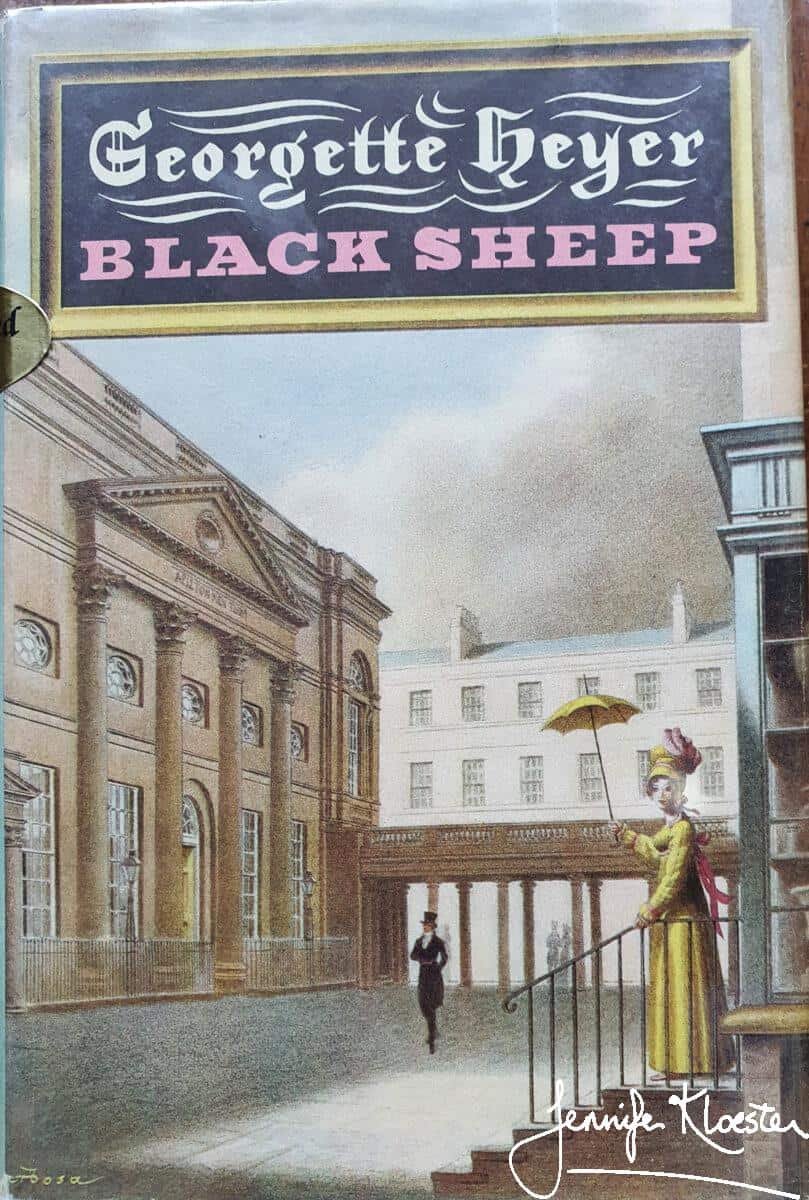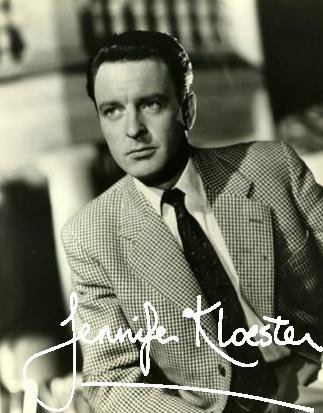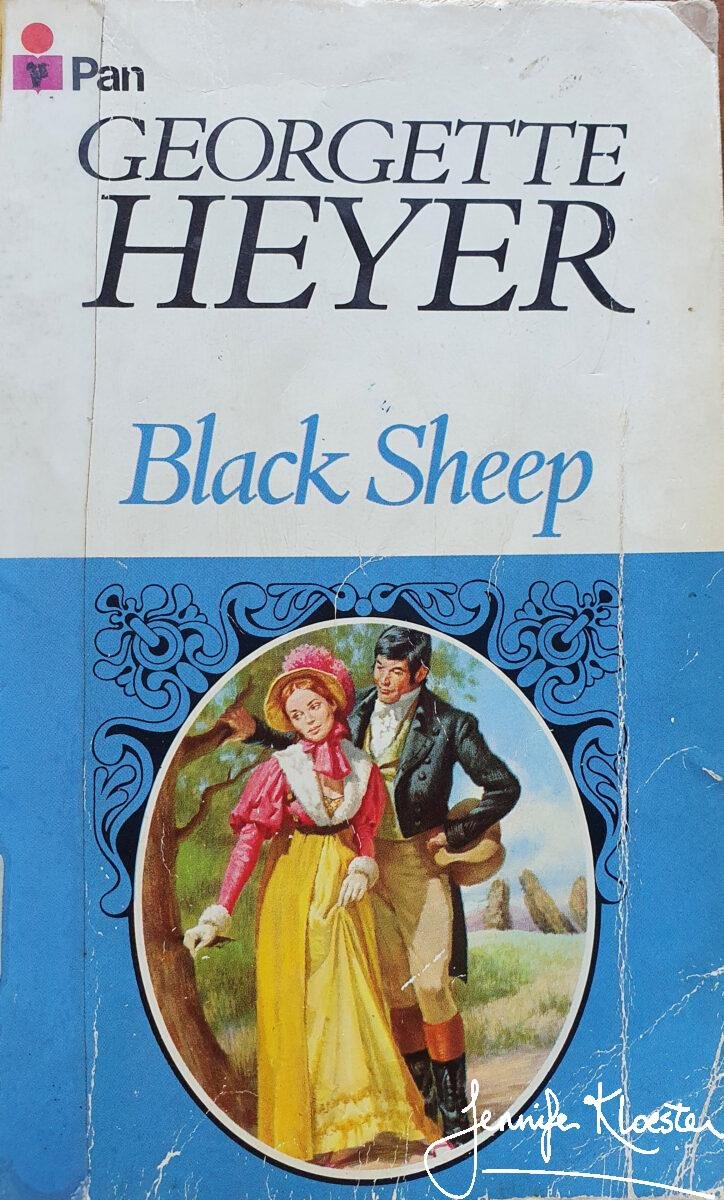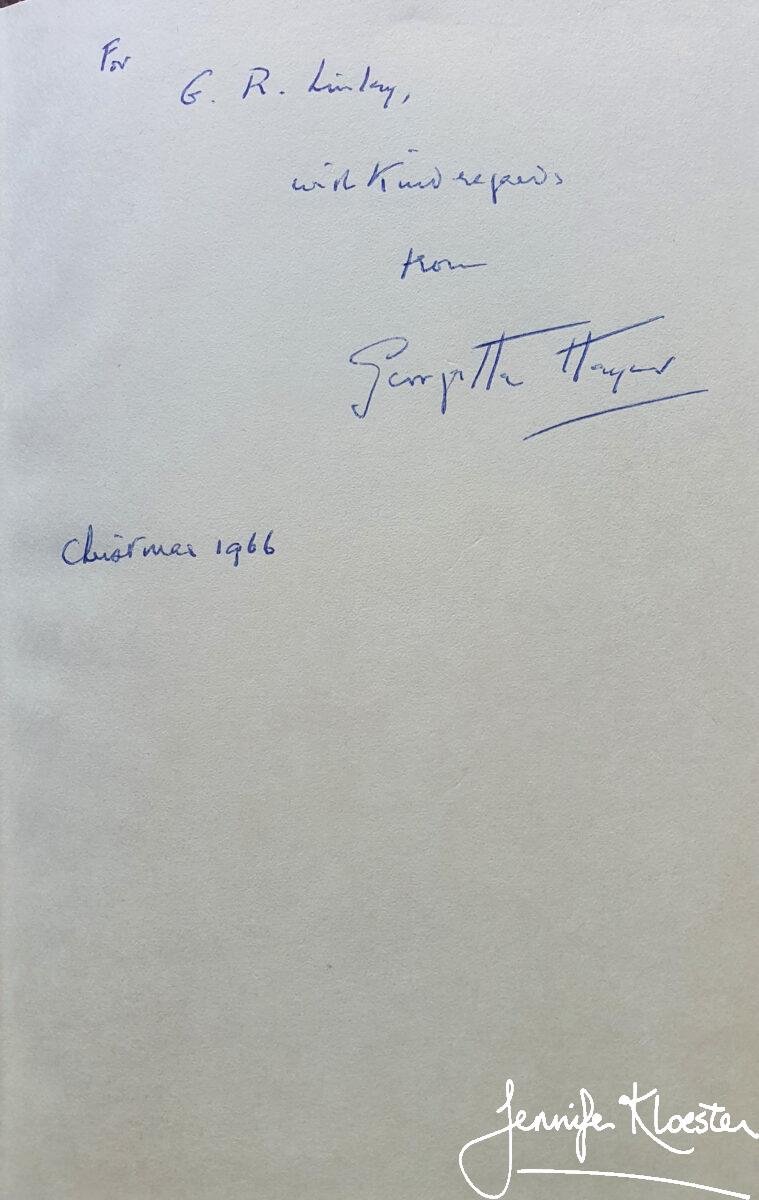“I hope you and Joan will have a good Christmas & that the New Year may be enlivened for you by news of my new book. At present I have none to give you, but don’t worry! It always happens like this, but, somehow or other, the New Book does get written!”
Georgette Heyer to Max Reinhardt, letter, 10 December 1965

A new book & a new accountant
The new book was eventually begun in March 1966. Though she had hoped to have begun it soon after Christmas, Georgette had been fully absorbed by accountant troubles. Despite a large and ever-increasing income from her writing, she and Ronald had never really understood the financial side of things. Early in 1966, things came to a head when it was realised that the company – Heron Enterprises, which she had set up in 1946 at her accountants’ direction – had some £80,000 in its account which Georgette could not touch without an enormous tax bill. After much procrastination they had finally agreed to part company with their old accountants and move to the firm of Geoghan, Black & Till. It would be Hale Crosse who would take over their tangled financial affairs and he would – eventually – do for the Rougiers what he had done for John Le Carre and save them a great deal of money! At first shy and suspicious, Georgette soon discovered that Hale Crosse was a charming, gregarious man and, like her, a chain smoker. It took time, but eventually – having discovered that she liked him very well – she dropped her guard and told him: “For goodness sake, Hale, call me George!”
I have been worried to the brink of the grave by my tangled finances, my late accountants having landed me in a real mess through their obsession with paying every penny I earn into the Company account, & paying nearly all bills out of this account (“Just a matter of adjustment!”), with the result that I now stand in the pleasing position of owing the Company something like £20,000 … In the middle of all this, I contracted a mysterious virus, & what that did to me is nobody’s business. So Black Sheep hasn’t made much progress, & since I’m still a trifle hazy about the plot I can’t give you a précis just yet. However, after a period of terrifying mental inertia, my brain has come to life again, & I now hope to forge ahead.
Georgette Heyer to Max Reinhardt, letter, 25 March 1966

Inspired by Sir Donald & Dorothy Sinden
Georgette may have been “a trifle hazy” about the plot but once begun it did not take her long to devise. This time her new novel would be inspired by their friends Sir Donald Sinden and his wife Diana. Ronald had first met the well-known actor, Donald Sinden, at the Garrick Club three years previously. This exclusive gentlemen’s club (despite various attempts as late as 2020 to see women admitted, today women may only visit the Garrick as guests) has long been home to many leading lights from the Arts world, including actors, writers, painters and poets. Donald Sinden had first made his name in the 1950s starring in such films as Mogambo, Doctor in the House and Eyewitness before going on to great acclaim as an award-winning actor in plays such as King Lear. The Rougiers and the Sindens became friends and occasionally invited each other to dinner or drinks in their respective homes. One evening Diana, dressed in a fabulous green velvet riding skirt and jacket (which won Georgette’s firm approval), went with her husband to a party at the Rougier’s apartment at Albany. She and Georgette got talking about their young people and Diana told her a story about a family she knew with a difficult son. This “black sheep” as she described him had been sent to Australia in disgrace only to come back years later grown up and having made a large fortune. Diana saw a “glance pass between Georgette and Ronald. Something had registered. The next book was Black Sheep.


“Ingenious”
“The plot, though slight, is ingenious – and the dialogue is full of wit (‘corky’ as Fanny might have said’)
Review by Stella Rodway, The Bookman, October 1966
A few weeks later, Georgette was in the thick of the new book and enjoying herself. Her pleasure in writing Black Sheep shows both in its masterful plotting and in it delightful characters. At first glance the story may seem slight – two spinster ladies living in Bath and caring for their pretty young niece have their formerly uneventful lives thrown into disarray by the arrival in town of a young and charming fortune-hunter. Undeceived by the handsome Stacey Calverleigh’s good looks and gracious manners, Abigail Wendover, on meeting his unusually casual uncle, Miles Calverleigh, begs him to intercede and save her niece from a disastrous match. Miles, however, is more interested in Abby than in her niece and has no interest at all in his nephew. This deceptively simple plot is, in fact, ingenious with a number of delicious twists and so many clues as to the ending laid in at the beginning that it requires more than one reading to fully appreciate them. The final chapters are among Heyer’s most satisfying. and worth reading just for Mrs Clapham and “Dolly the Dasher”! Black Sheep is also a novel in which Georgette has a lot to say about family relationships – not all of which are shown in a favourable light. There is reality and considerable life experience woven into Black Sheep some of which perhaps reflects some of its 63-year-old author’s own feelings about family and relationships.

A truly original hero
Listening to Black Sheep on Penguin audio and read beautifully by Natalie Simpson, one is once again reminded of Georgette Heyer’s extraordinary talent. In book after book she meticulously crafts her story, often so cleverly and with such skill that the brilliance of the plot is not fully appreciated on the first reading. What is even more incredible, however, is that despite being her 52nd novel, Black Sheep is a genuinely fresh new story. As Heyer herself gleefully acknowledged, it contains a truly original hero – or, as she told her friend Pat Wallace – “A New Model”. Quite an achievement forty-five years after publishing her first book!
My nose is sore from the grindstone, but I have made some progress with Black Sheep, & am feeling more hopeful about it since the appearance on the scene of the New Model Heyer-Hero. I rather wondered if I could handle him, but as he has already made his my Life’s Companion burst out laughing at least six times, I obviously can. But he’s a bit tricky. And really a New Model! The only thing he has in common with my other models is Fortune, but as no one knows this until nearly the end of the book, it doesn’t count. He made it in India, probably by unscrupulous methods, but as I can’t be bothered to mug up trading with India I shan’t go into that. He isn’t smart, he doesn’t drive blood-horses all over the place – or at all, he isn’t enigmatic, or supercilious, or bad-tempered (like no. 2 model), & he isn’t a Know-All (Heyer-hero No. 1). He can best be described as an amiable cynic, & I’m having quite a lot of fun with him.
Georgette Heyer to Pat Wallace, letter, 29 April 1966

“The blurb”
“Could you give me an outline of the plot of Black Sheep so that we can write the blurb, as I would like to include it in our autumn list. Even if we don’t publish in the autumn it will help the subscription enormously to have it in the list as soon as possible.”
Max Reinhardt to Georgette Heyer, letter, 24 March 1966
Max has achieved a truly brilliant Blurb for the book! On demand, I wrote him one of my less helpful letters, telling him that that the book isn’t about anything much, but describing the hero. Out of which he has concocted a gorgeous bit of waffle, which means as little as my letter to him, but conveys a general impression of super-excellence.
Georgette Heyer to Pat Wallace, letter, 29 April 1966
“Miss Heyer’s new Regency novels is set in Bath where she is particularly at home. Stacy Calverleigh, having gambled away the family fortune, is in low water, his estates heavily mortgaged and his debts prodigious. He descends on the town on the look-out for a likely heiress, and quickly makes a conquest of Fanny Wendover, a dazzling, high-spirited orphan of seventeen. Fanny’s aunt, Abigail, knowing Stacy’s reputation, determines to put a stop to this affair, but the arrival on the scene of Stacy’s uncle, Miles, – the Black Sheep – does nothing to advance her plans. Black Sheep is one of Miss Heyer’s lighter-hearted romances, with a charming heroine and a most intriguing hero –mysterious, good-humoured, cynical, outrageous and in the end irresistible.”
The original blurb for the 1966 first edition of Black Sheep

Much admired
Published in October 1966, Black Sheep went straight to the top of the bestseller list. Three months after publication the book had sold almost 60,000 copies in hardback and Georgette’s publishers were full of congratulations for their perennial bestselling author. In America her latest US publisher, Dutton’s, had also made a big splash with the novel. Their enthusiasm for Heyer novels had seen her sales in America increase enormously. Her agent and friend, Joyce Weiner, who handled all of her overseas publishers, had worked hard to improve Heyer’s profile in America. The result of her “untiring labour” saw a doubling of Dutton’s advances and a deal with Bantam to publish Georgette in paperback thus netting her famous author an extra £14,000! Georgette happily told her publisher that ” a staggering amount of interest being shown in me in the States. So that’s cheering.” On both sides of the Atlantic, in Australia, South Africa and New Zealand, Georgette’s novels were winning acclaim. As Michael Hardcastle explained to his readers:
Georgette Heyer’s Black Sheep, Bodley Head, 21s. possesses not an atom of today’s most popular mixture for fiction of sex, sadism and undeviating realism. What it does have is wit, comedy and a style whose elegance is matched only by the story’s setting in Regency Bath, surely the most captivating city in all Britain. The heroine of this sumptuous romance, which for too long has been a pejorative term in fiction, is a spirited creature called Abigail Wendover. Although at 28 she is still a spinster, it is by her own choice: she has rejected several tempting proposals for she has loved not one of her suitors. Abby is determined to protect her heiress niece, Fanny, a 17-year-old beauty form the clutches of Stacy Calverleigh, an unscrupulous fortune-hunter up to his unburning ears in debt. The arrival in Bath of Stacy’s uncle, Miles Calverleigh, tends to distract Abby from her family duties. For Miles, who was packed off to India twenty years earlier and is still regarded as the black sheep of the distinguished Calverleighs, begins to court her in a manner apparently less gallant than convention demands. The scurrying gossips of Bath look set for a field day. Abby, however, is well able to look after herself as well as her niece… but few intelligent women could or would want to resist the intriguing advances of a man like Miles. Equally, few readers will want to deny themselves the pleasure of this equally entrancing tale.
Michael Hardcastle, The Liverpool Echo, 8 December 1966




